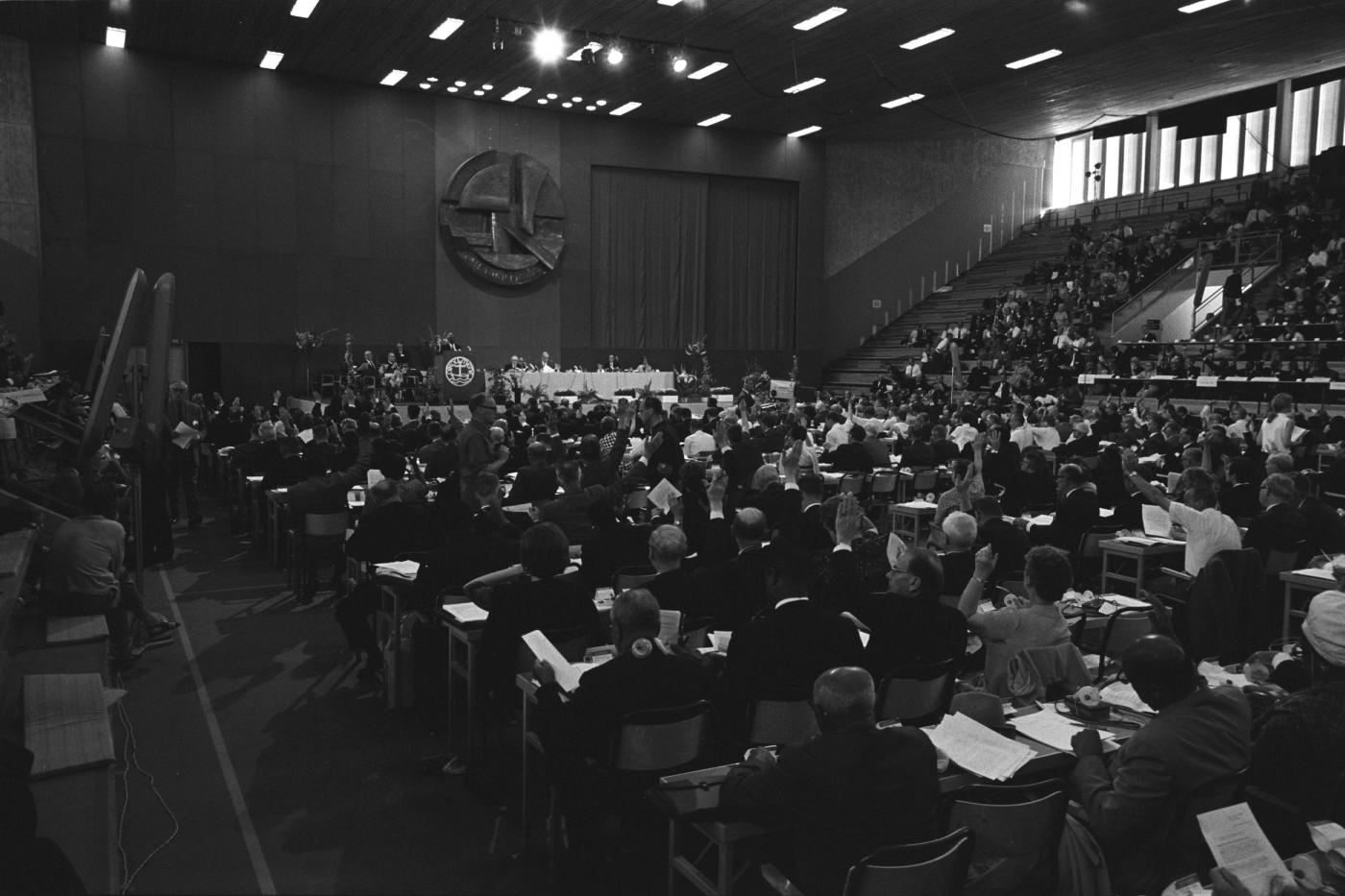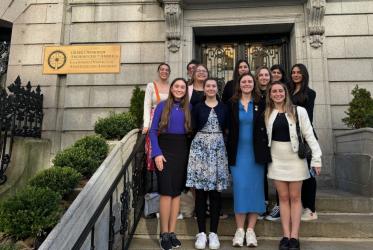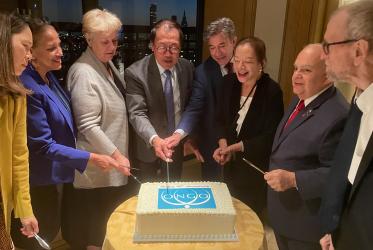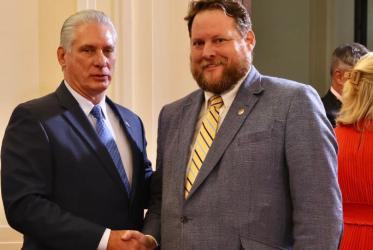In 2018 we celebrate the 70th anniversary of the World Council of Churches. In order to create a lively firsthand account of the ecumenical fellowship and of our shared journey, member churches have contributed stories of people, events, achievements and even failures, all of which have deepened our collective search for Christian unity.
This story was written by Gerard S. Valdivia, a retired Pentecostal Church of Chile pastor and social worker.
The views and opinions expressed in this article are those of the author and do not necessarily reflect the basic principles of the World Council of Churches.
In August 1968, the Most Reverend Enrique Chavez, founding bishop of the Pentecostal Church of Chile, a Methodist offspring in Chile, and his pastor, Reverend Gerard S. Valdivia, were returning to Chile after attending the 4th Assembly of the World Council of Churches (WCC) in Uppsala, Sweden.
Bishop Chavez had attended the assembly as the official delegate of the Pentecostal Church of Chile, a WCC member church since the previous assembly in 1961, and he had just been elected to the WCC Central Committee in Uppsala. Rev. Gerard Valdivia was a delegated observer to the assembly and also acted as his bishop’s interpreter, Spanish not yet being an official WCC language.
While the two men were discussing the assembly document, "The Holy Spirit and the Catholicity of the Church”, presented by Bishop Karekin Sarkissian from the Armenian Apostolic Church, Bishop Chavez turned to his pastor and said, “Gerard, I feel from the Lord that you must come to New York City to start mission work there among Hispanic residents."
His pastor was stunned into silence. After some moments, he responded: "That I come to New York to start a mission? I think that I could not do that."
Bishop Chavez replied, “Well, it is up to you to obey or disobey, Gerard.”
His pastor was silent again for some time and finally said: "My bishop, when I get home I will talk to my wife and the board of elders of my church about this commission, and we will pray about it.”
An ecumenical seed had been planted.
Beginnings
In October 1969 Rev. Gerard Valdivia, his wife Deaconess Mirta Abigail, and their two young sons left their beloved Chile to go as missionaries with legal immigrant status to a country with a completely different culture, trusting that the Lord would be faithful and guide and protect them in every way.
They came first to Lexington, Kentucky, where Mr Valdivia was to work for an initial period of time at a mental health clinic.
Great spiritual and emotional encouragement came for the missionary family during those first sometimes lonely months in a foreign country in the form of letters from Bishop Chavez, their spiritual leader in Chile; the then-secretary for evangelism in the WCC Division of World Mission and Evangelism, Dr Walter Hollenweger; and Rev. David J. du Plessis, a South African Pentecostal minister living in California.
To Brooklyn
In August 1971 Rev. Gerard Valdivia and his family moved to a Hispanic area in Brooklyn, New York. With some financial assistance from the Evangelical Church in Germany, he rented a small storefront where, on Christmas Eve 1972, he began to conduct worship services with coworkers from the factory where he was working.
Eventually, after much evangelism and teaching of the gospel, the Chilean mission had enough members and supporters to become the Pentecostal Church of North America (PCNA).
But early on in their mission work, the faith and commitment of the Chilean missionaries had to pass a difficult test. One evening, Rev. Gerard S. Valdivia saw a young man passing by his house, bleeding from the head, his face full of blood. He offered help and took him to a nearby hospital, not knowing the man was a member of a street gang.
Later that night, members of a rival gang came by, pierced the tires and broke one of the mirrors on the church van. Fearing for his and his family’s safety, Rev. Gerard S. Valdivia took the advice of neighbors and members of his church and moved to another area of Brooklyn.
Evangelism outreach of the Sunset Park Pentecostal Church in Brooklyn. Photo: Gerard S. Valdivia
UCC neighbors
A while later a further ecumenical seed began to take root.
It was 6pm on a warm summer evening in 1980. Rev. Gerard Valdivia came to pick up a member of his congregation in the church’s van. He parked the vehicle in front of the Finnish Congregational church, part of the United Church of Christ (UCC), next door.
At that precise moment, the church’s pastor, Rev. Eino Salo, was coming out the door. He read the name on the side of the vehicle and said to Rev. Gerard Valdivia, “So, you are Pentecostal.”
Thus, began an ecumenical journey that led to the Chilean mission renting the beautiful Finnish Congregational church. They began worshipping there on 22 October 1980.
Desire for partnership
The ecumenical seed sprouted further when the Chilean missionary expressed to his Finnish counterpart his desire to make contact at higher levels of the church and work towards an international partnership agreement between the Pentecostal Church of Chile and the UCC, also a WCC member church.
A meeting with the two Brooklyn pastors, UCC area minister Dr Thomas Boates and Dr Jeff Utter, director of the UCC department for Latin American and the Caribbean soon took place at the Interchurch Center in New York City where the Rev. Gerard S. Valdivia was now working.
Dr Utter asked Rev. Gerard Valdivia how he knew that the UCC was looking for a church in Chile with which to begin a partnership agreement. The Chilean pastor simply replied, “I did not know that, but the Lord knew it.”
In June 1981 Bishop Chavez came to New York City to attend a meeting with UCC church leadership at their head offices. Present for the UCC were Dr Utter; Rev. Elinor G. Galucha, director of overseas ministries; Dr David M. Stowe, executive vice president for overseas ministries; Dr Dalton Smith, assistant executive vice president for overseas ministries; and Ms Audrey C. Smack, secretary for world affairs. Rev. Gerard S. Valdivia accompanied Bishop Chavez.
Bishop Chavez expressed joy at these initial, extraordinary ecumenical contacts, and he asked UCC to send a representative to the Chilean church’s next annual conference in February 1982.
The first to go was Dr Gustav Kuether, a former missionary to a country in Central America who spoke fluent Spanish. Several more UCC executives followed during these marvelous years that these two Christian bodies of such different historical and social backgrounds were getting to know each other.
Formal agreement
From 27 June to 2 July 1985 Bishop Chavez, Rev. Nicolas Concha and Rev. Gerard Valdivia attended the UCC general synod in Ames, Iowa, at the invitation of the US church. The most joyous moment for the Chileans came when UCC president Dr Avery Post proposed that the UCC and the Pentecostal Church of Chile enter into a partnership agreement to the glory of God. The resolution was adopted unanimously.
Sadly, Bishop Chavez saw only the beginnings of this marvelous ecumenical relationship. After Ames, he suffered a sudden, intense attack of dementia and lost all memory of his historical trip to the United States. Five years later, he went to be with his Lord.
His successor, Bishop Ulises Munoz M., has provided the necessary support to ensure the partnership’s continuation. He welcomed a partnership initiative from the UCC’s Massachusetts (MA) Conference and was instrumental in the “sister church” contacts between local MA Conference churches and Pentecostal churches in Chile.
Ecumenical fruits
Visits by pastors and young people have nourished a fluid ecumenical relationship. In 1995 Rev. Oscar Aguayo and his family drove thousands of miles as missionaries in residence at the MA Conference’s invitation, spending a year sharing in US churches about the Chilean Pentecostal experience and the phenomenal growth of the Chilean Methodist Pentecostal movement.
The partnership has borne ecumenical fruit with other churches as well. Through the UCC’s partnership agreement with the Christian Church (Disciples of Christ) in the United States, missionary Elena Huegel came to Chile to assist the church in Christian education and other areas. The Chilean church has now a Bible institute, with graduates from the ecumenical Comunidad Teológica Evangélica de Chile (Evangelical Theological Community of Chile) as teachers.
One day Ms Huegel had a brilliant idea. Wouldn't it be wonderful, she thought, if the Pentecostal Church of Chile would have a center in the Andes Mountains as a place for study of the word of God, environment issues and other concerns.
With financial assistance from her denomination, plus young people's efforts and support from the other denominations, the dream came to be a wonderful reality: a beautiful conference center that Ms Huegel named Centro Shalom - Shalom Center.
The Pentecostal Church of Chile has undoubtedly experienced and continues to experience the goodness of the words of the Lord Jesus recorded in John 17:21: “ … that they all may be one … so that the world may believe … ”
More information about 70 years of the WCC
Read more WCC 70th anniversary stories
If you would like to tell your own story, please be in touch!







